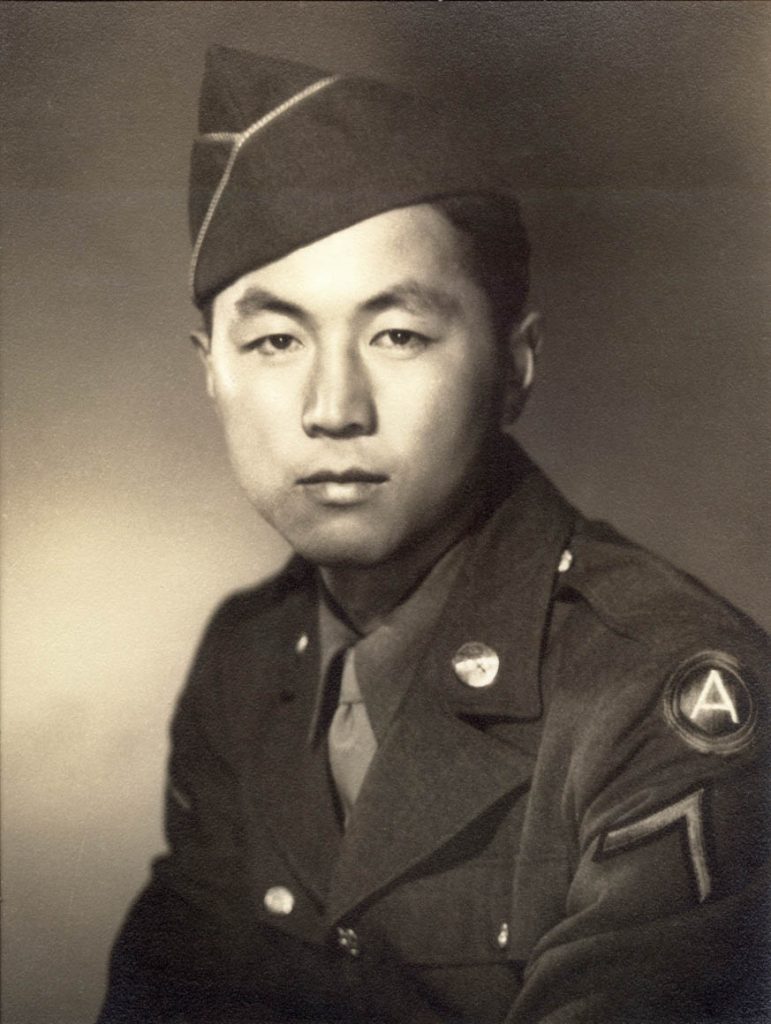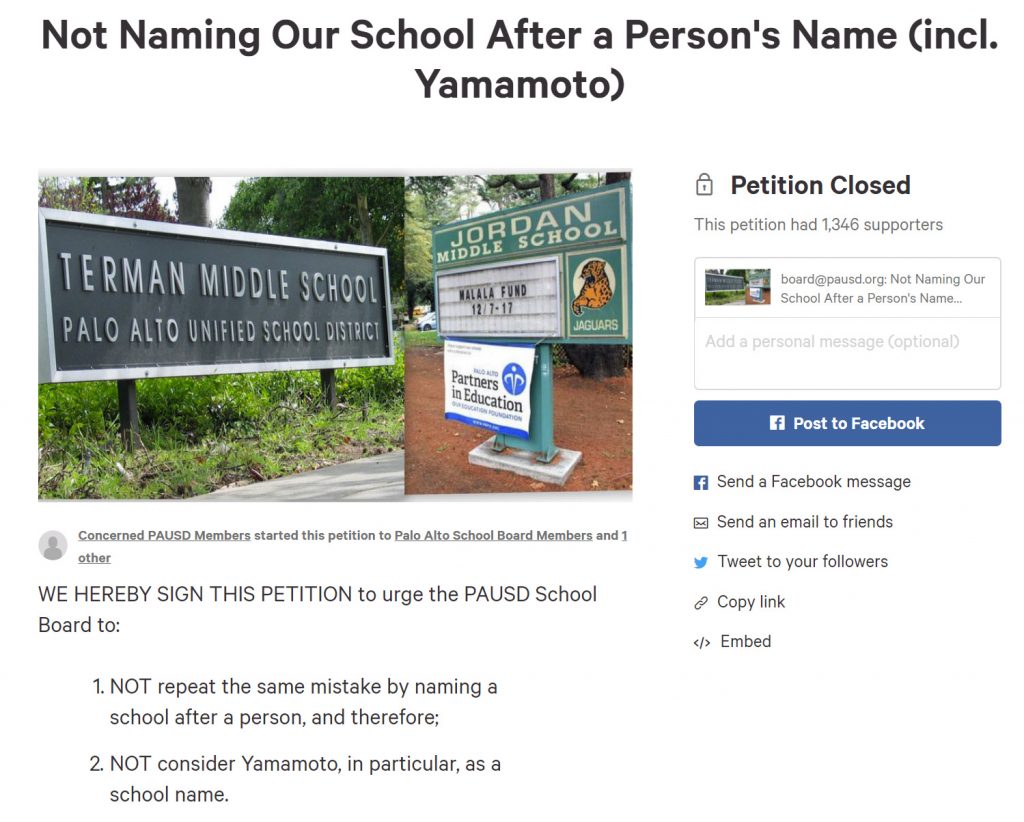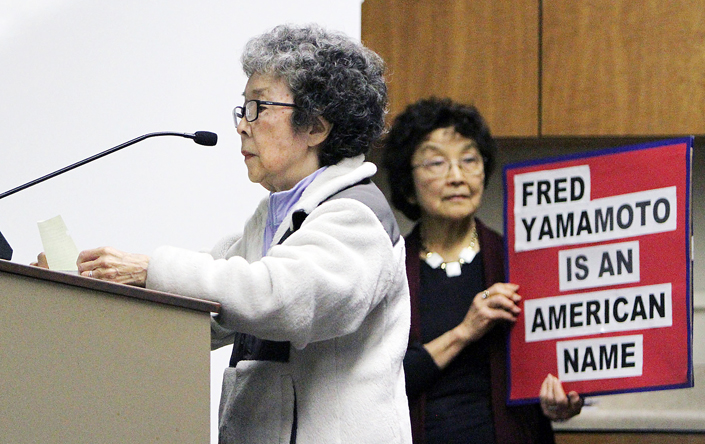April 27, 2018
In the aftermath of Pearl Harbor, Palo Alto resident Fred Yamamoto was incarcerated along with tens of thousands of other Japanese Americans, the majority of whom were American citizens. Though they’d not committed any crimes, they were deemed agents of the enemy solely because of their ancestry. Uprooted from their home, Fred and his family were sent first to the Santa Anita detention facility and later to Heart Mountain concentration camp.

There, Fred worked as a staff writer for the Heart Mountain Sentinel and kindled his new love for a young woman named Michiko Yamada. In 1943, he was the first Heart Mountain incarceree to volunteer for the U.S. Army, motivated in part by a desire to prove Japanese American allegiance and to “prepare for peace.”
He joined other Japanese Americans in the 442nd RCT and was stationed in Southern France, but his service ended tragically in October of 1944. At just 26 years of age, he lost his life at the hands of German soldiers while trying to bring much needed food supplies to the Lost Battalion. A Purple Heart was delivered to his recently widowed mother at Heart Mountain.
Despite sacrificing his life to in an attempt to help his fellow countrymen, Yamamoto is apparently still not American enough for some to accept him as an American hero.
Earlier this year, Palo Alto Unified School District (PAUSD) endeavored to change the names of two middle schools that currently take their names from men who were proponents of eugenics, David Starr Jordan and Lewis Terman. PAUSD assembled a renaming committee — which notably lacked any Asian American or Latinx representation — to vet suggestions and to recommend new namesakes.
Fred Yamamoto’s name surfaced as the leading candidate to be honored with this recognition. In a report to the school board the renaming committee wrote, “Of all the individuals considered, the Committee felt that the name, Fred Yamamoto, was most worthy of consideration as the future name of a Palo Alto school.”
But “concerned citizens” in Palo Alto mobilized to stop the board from approving the name.
The group — led by a “small, vocal subset” of first generation Chinese Americans — argued that Fred’s last name might “get confused” with Isoroku Yamamoto, the architect of the Pearl Harbor bombing.
They circulated a petition that urged the renaming committee to avoid naming the schools after any one individual, but especially not Yamamoto. Petitioners cited “feeling,” “confusion,” and “risks” as the primary reasons to block Fred Yamamoto from being honored as a middle school namesake. They elaborated:
“There exist certain hurt feeling when the last name ‘Yamamoto’ is mentioned, especially for Asian immigrants whose families were tragically affected in China, Korea, and Southeast Asian countries during World War II.”
One may argue “Yamamoto” is a common and popular Japanese last name and, in this context, represents Fred Yamamoto rather than the Isoroku Yamamoto. Mr. Fred Yamamoto is, without a doubt, an inspirational figure, but sadly enough, his last name undeniably also symbolizes a notorious figure from World War II – Isoroku Yamamoto. It is inevitable that explanations about the origin of the name will often be necessary. People may be confused about which Yamamoto a school’s name is referring to: in conversation, the full name of a school is almost never used.”

Comments from petition signers echoed these sentiments. “I strongly against changing the school’s name, let alone changing to a war criminal’s name [sic],” wrote a petitioner named Qingping Tian. Another, who signed as Tina Jiang, wrote: “Definitely no Yamamoto! Imagine our students wearing a school T-shirt with this name, what other school children will think? Are you using a World War II criminal name as school name? This is ridiculous.”
To recap: the petitioners think that a man who was unjustly incarcerated and then gave his life fighting on behalf of his country during WWII because of Pearl Harbor, shouldn’t get the recognition he deserves in his hometown because he just so happens to have the same last name as the war criminal who orchestrated the attack. Wow. Talk about not being able to catch a break.
Look, we’re sorry that, like many of us, your families’ lives were interrupted and cut short by the devastation of WWII. We really are. But you must understand that your case against Fred Yamamoto Middle School traffics in the same racist and xenophobic nonsense we heard in the aftermath of Pearl Harbor. This “guilty by association” logic was used to justify the mass incarceration of 120,000 Japanese Americans and Japanese immigrants during World War II. In 1988 our country admitted they majorly screwed up on that one, so it’s deeply alarming that in 2018 more than 1,300 people signed a petition that endorses the same dangerous line of thinking.
And just like in 1942, some media outlets fanned the flames with incendiary headlines. Take, for example, The Daily Post’s: “School might get the name of Pearl Harbor mastermind Yamamoto.”

In the ensuing opinion piece, the paper’s editor Dave Price wrote that a reader called him, “very concerned that a school might get the name Yamamoto. She said that if there were a good person who happened to have the last name of Hitler, we wouldn’t name a school after him because of the confusion. She wondered why nobody had noticed this previously. ‘Don’t they teach history in the schools?’ she asked.”
Funny, we’re asking that exact question.
(Side note: The editor of that paper, Dave Price, didn’t think the school names should be changed at all because, hey, those guys they’re currently named after were racist eugenicists back then, but so was everyone else and “certainly if they knew what the future would hold, they wouldn’t have supported eugenics.” Right.)
The Hitler rhetoric surfaced again at PAUSD’s “Recommending School Names Advisory Committee” meeting in March. As The Mercury News reported, “One parent said giving a school the Yamamoto surname is akin to naming a school with Jewish students after Adolf Hitler or anyone with Hitler as a last name.”
Let’s just pause to note the bitter irony here: An American who was literally killed by Nazis, was repeatedly compared to Hitler in this debacle. This, in an era in which actual neo-Nazis are deliberately naming themselves and their children after Adolf Hitler! Pssst, guys, we have bigger problems here.
And it’s amazing how we’ve managed to avoid confusing George Washington with Booker T. Washington, or Andrew Jackson with Michael Jackson all these years. So why is it that ya’ll are suddenly stumped when it comes to telling the difference between a decorated American veteran and a foreign war criminal? The answer clearly lies at the nexus of racism, nationalism, and xenophobia.
In advance of the school board’s March 27 hearing on the matter, Japanese Americans and allies mobilized in defense of the Yamamoto renaming. Local and National chapters of the Japanese American Citizens League and the Organization of Chinese Americans – Asian Pacific American Advocates (OCA) penned letters in support of Fred Yamamoto.
Despite their efforts, the PAUSD board voted to “avoid controversy” and name the school after two other locals. Meanwhile, Yamamoto’s good name has been so thoroughly dragged through the mud that others who share the common surname are now concerned. “Palo Alto resident Rika Yamamoto said that she feared for her children, given the hostility toward her last name,” The Rafu Shimpo reported.
Meanwhile, Yamamoto’s supporters have established a scholarship fund to honor him. The GoFundMe Page for the scholarship explains:
“This has been a difficult and painful issue, but also presents us with an opportunity to seek to build empathy and understanding. Fred’s message of faith in American democracy and justice, resilience in the face of discrimination and adversity, and devotion and service to community can be an inspiration to us all.”
At $15,005 in donations and counting, the fundraiser has far exceeded its original goal and the first award will be given to a student this spring.
But old wounds have been reopened and PAUSD has work to do. The district had its heart in the right place when it decided to strike the names of eugenicists from its schools, but by caving to the dangerously familiar arguments of some of the community’s “concerned citizens,” the board dishonored the memory of Fred Yamamoto. They also taught their students a harmful lesson in xenophobia. In the age of the Muslim Ban we need the very opposite — affirmation that individuals should be judged based on their actions, not on invented associations based on race, religion, nationality.
The Rafu Shimpo reported that eight of Yamamoto’s nieces and nephews issued a statement saying that their uncle “would have regretted how much time and attention has been squandered regarding the Yamamoto surname, hijacking the focus away from the real issue at hand of promoting and honoring future role models for students. But he would just respond that there is more work to be done.”
Indeed, in writing for The Heart Mountain Sentinel before he left the camp for combat, Yamamoto opined:
“We are living in a country that is comparatively young…everyone knows that individuals are not perfect and so long as governments are manned by individuals there will be mistakes. But, at least, if mistakes are made in this country and the majority of the people feel that a wrong has been committed, the individual or wrong can be removed.”
PAUSD and some of its “concerned citizens” have committed a wrong, and we urge them to correct it by ramping up their public education offerings and school curriculum on Japanese American history, creating spaces for productive dialogue (like this, but hey maybe with some Japanese American representation next time?), and by working with their community to find some other suitable way to honor its hometown hero Fred Yamamoto.
—
Densho Staff, with thanks to an anonymous member of our community for bringing this issue to our attention.
[Header photo: Jeanette Arakawa (left) and Eimi Okano joined others to speak in support of Fred Yamamoto at the PAUSD board meeting on March 27, 2018. Photo by Brad Shirakawa for The Rafu Shimpo.]

